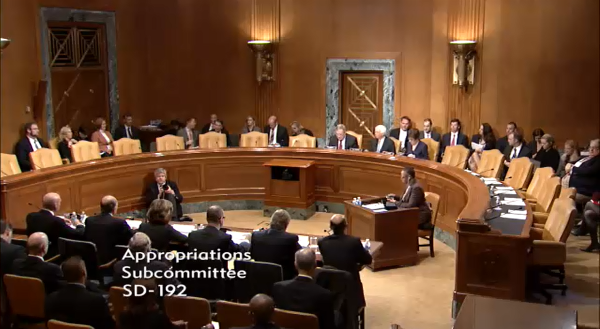 |
| The IAM provided key testimony at a Senate Subcommittee on Defense hearing about sequestration’s dire impact on jobs and the economy. |
As Congress considers extending the misguided sequestration in ongoing budget talks, the Senate Subcommittee on Defense held an important hearing on sequestration’s crippling effects on jobs, troop safety and the nation’s defense manufacturing capability.
The Committee hearing, “Sequestration and the Defense Industrial Base” heard testimony from numerous defense and aerospace industry experts, an elected official, and an IAM representative about sequestration’s negative effects on job growth and the nation’s future ability to manufacture defense-related products.
 |
| Owen Herrnstadt, Chief of Staff to the International President, testified at the hearing. |
“Given the nature of the work that our members perform, the IAM truly understands the importance of the U.S. defense industrial base and defense manufacturing for our economic and physical security. We believe that a strong domestic industrial base is one of the essential elements needed to restore our economy and maintain a safer, more prosperous and more sustainable future,” said Owen Herrnstadt, IAM Chief of Staff to the International President, who testified at the hearing. “Sadly, sequestration represents a continued threat to our defense industrial base, our economic recovery and our future.”
Because sequestration rules force both civilian and military agencies to make across-the-board reductions, programs that are vital to military readiness or public safety are cut alongside other programs. Sequestration is also forcing the military to delay purchases in large programs for fighter and other aircraft, delay large maintenance jobs such as refits for aircraft carriers and submarines for the Navy, and curtail training and other services. These cutbacks hurt suppliers and support companies.
As support companies and prime contractors lay off workers, the vital skills and knowledge those workers have are lost. Many do not return to the industry because the budget fights create uncertainty and fear of being laid off again.
“In 2013, the defense department had its budget cut by $37 billion. Unless something is done, defense cuts in 2014 will be 50 percent larger than those faced last year, a total of $52 billion,” said Subcommittee Chairman Dick Durbin (D-IL).
“The second round will cut even more deeply and in other areas. It will cut into acquisition. And when we cut into acquisition, we cut jobs across America. It is estimated that round two of sequestration will cost us 800,000 jobs across this nation,” said Durbin. “Think about that, good-paying jobs in the defense industry, related contractors and subcontractors gone in virtually every state across the nation.” Durbin also warned that sequestration cuts would lead to more rounds of base closures and even reductions in the basic benefits provided to military personnel.
Durbin ended the hearing by urging panelists to mobilize their constituents, employees and members to contact their legislators in the House and Senate and urge them to avoid another round of sequestration. The Budget Conference Committee has a December 13 deadline to reach a comprehensive budget agreement. “We have four weeks to do it,” urged Durbin.
Click here to watch a webcast of the entire hearing.
Click here to read the IAM’s testimony to the Committee.
Click here to tell Congress to stop sequestration.